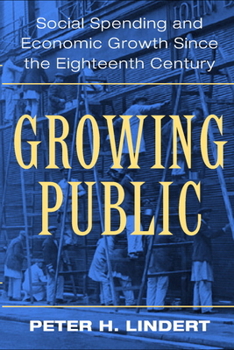Growing Public: Social Spending and Economic Growth Since the Eighteenth Century
(Book #1 in the Growing Public Series)
Select Format
Select Condition 
Book Overview
Growing Public examines the question of whether social policies that redistribute income impose constraints on economic growth. Taxes and transfers have been debated for centuries, but only now can we get a clear view of the whole evolution of social spending. What kept prospering nations from using taxes for social programs until the end of the nineteenth century? Why did taxes and spending then grow so much, and what are the prospects for social spending in this century? Why did North America become a leader in public education in some ways and not others? Lindert finds answers in the economic history and logic of political voice, population aging, and income growth. Contrary to traditional beliefs, the net national costs of government social programs are virtually zero. This book not only shows that no Darwinian mechanism has punished the welfare states, but uses history to explain why this surprising result makes sense. Contrary to the intuition of many economists and the ideology of many politicians, social spending has contributed to, rather than inhibited, economic growth.
Format:Paperback
Language:English
ISBN:0521529166
ISBN13:9780521529167
Release Date:February 2010
Publisher:Cambridge University Press
Length:377 Pages
Weight:1.22 lbs.
Dimensions:1.0" x 6.7" x 9.1"
Customer Reviews
3 ratings
Counterintuitive and powerful.
Published by Thriftbooks.com User , 19 years ago
The conventional wisdom among the members of the public is that the European welfare state is based on progressive taxation, with the government taking the role of Robin Hood. Lindert totally refutes this notion. He shows convincingly that throughout the modern history, the greater welfare expenditure has always been accompanied by increasingly regressive taxation, contrary to what people--especially American liberals--tend to believe. While the tax on income may appear more progressive, this hides both the fact that most European countries--especially those with high welfare expenditures--rely heavily on indirect taxes which are generally regressive in nature, and that numerous loopholes reduce effective tax rate even for income. The logic driving the study is simple: people pay for what they get; they don't put up with being forced to pay for what they don't get. This is not a completely new notion--Sven Steinmo has done a similar study, albeit over a much shorter time span and concerning a lot fewer countries, with similar findings, but the study remains rather obscure. One hopes that more people read thes studies--which they probably won't--so that many of the common misperceptions about social policy (even among professional economists!) would go away.
Your best hopes confirmed
Published by Thriftbooks.com User , 19 years ago
Peter Lindert has done humanity a great service, settled many scores, and given us both a perspective and a vocabulary with which to address the contentious issue of social spending and wealth transfer. "Growing Public" is one of the greatest contributions to Economic theory in the past century. Anyone with a social conscience owes it to himself to read this book and make its findings widely known. One of the book's many virtues (it is based upon very hard historical data) is that it is entirely readable.
Clear headed and practical
Published by Thriftbooks.com User , 20 years ago
This is a very informative book that clears up lots of misconceptions. It explains why the "wellfare state" is still around, even after so many death notices. The analysis shows that there is no net negative cost for comprehensive and universal social programs, and that there are often significant benefits. For those who can read this book without ideological and political blinders, there is much to learn from Peter Lindert's book.





